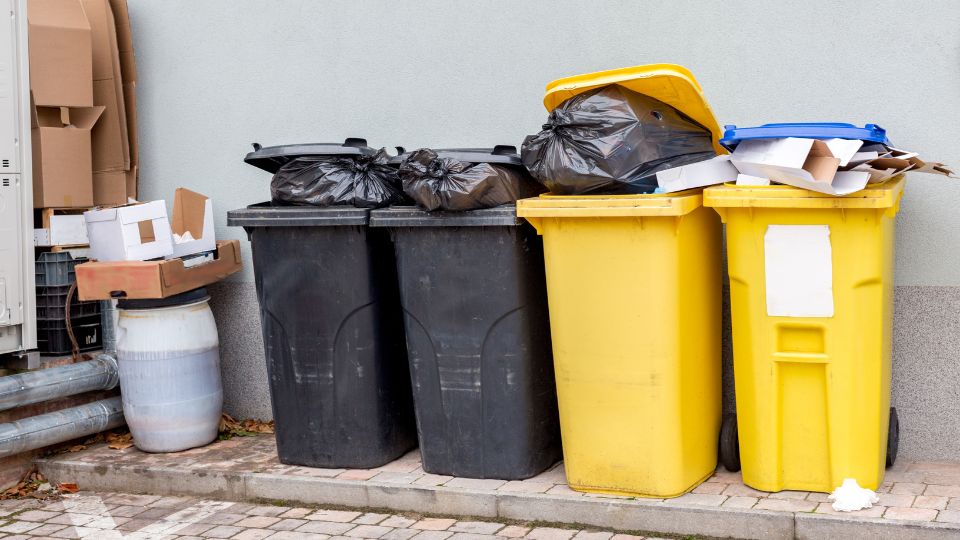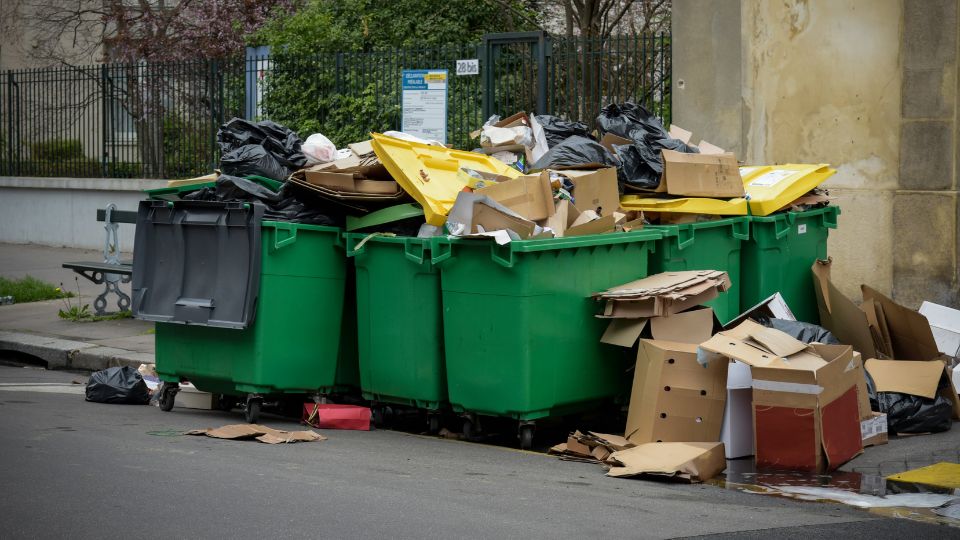
This guide will explain the key differences between residential and commercial waste collection, specifically focusing on weight limits and what happens if you exceed them.
Understanding the regulations surrounding overweight bins can save you from unexpected fees and help you comply with legal requirements.
Table of Contents:
- Residential vs. Commercial Bin Collections
- Why Exceeding Weight Limits Matters
- The Impact of Compressing Waste
- How To Avoid Excess Weight Charges
- What Are The Bin Weight Limits?
- How Waste Managed Can Help: No Excess Weight Fees
- Conclusion
Residential vs. Commercial Bin Collections
In residential settings, local councils typically collect waste bins regardless of their weight, provided that all waste fits within the wheelie bin.
This means that as long as the lid can close, the bin will usually be collected without any issues. However, this is not the case for business waste collections.
For businesses, waste management companies have strict weight limits for commercial wheelie bins.
This is primarily due to the landfill tax, which is a government-imposed charge aimed at reducing the amount of waste sent to landfills and encouraging recycling and waste reduction.
The heavier the waste, the more it costs to dispose of it, making it necessary for waste management companies to enforce weight limits on commercial bins.

Why Exceeding Weight Limits Matters
Exceeding the weight limits for commercial waste bins can lead to several issues:
Refused Collection
If your bin is too heavy, the waste collection company might refuse to collect it. This can result in your waste not being disposed of on time, leading to potential health and safety risks and non-compliance with waste management regulations.
Excess Weight Fees
Waste collection companies often impose excess weight fees if a bin exceeds the specified weight limit. These fees can add up quickly and significantly increase your waste management costs. They also tend to be unexpected and can throw a curveball for your budget.
Operational Delays
Overloaded bins can cause delays in waste collection services. Waste collection trucks have weight limits for safety and legal reasons, and exceeding these can cause operational disruptions. This can cause missed collections for other businesses on your collection route.
In fact, if you’ve had a missed collection yourself, it could have been because another business owner overfilled their bins.
The Impact of Compressing Waste
It might seem like a good idea to compress waste in your commercial wheelie bins to make the most of the space available. However, compressing waste can make your bins excessively heavy, even if all the waste fits inside.
This can lead to the issues mentioned above: refused collections, additional fees, and potential fines.
To avoid these problems, it’s crucial to understand your waste provider’s weight limits and manage your waste accordingly. Regular monitoring and proper waste segregation can help reduce the weight of your waste, ensuring it stays within the allowable limits.

How To Avoid Excess Weight Charges
The best way to avoid excess weight is to keep an eye on the amount of waste your business is regularly producing and ensure you have big enough bins. You may need to upgrade from a 240L bin to a 660L for instance.
Segregating your waste into other waste streams such as having a dedicated food waste and recycling bin will also reduce how much waste goes in each container and significantly reduce your chances of incurring any excess weight fees. It’s also far better for the environment as less waste goes to landfill.
What Are The Bin Weight Limits?
Weights are dependent on the size of the bin and the type of waste it holds:
240L Wheelie Bin
- General waste: maximum 10kg
- Dry mixed recycling: maximum 10kg
- Glass waste: maximum 100kg
- Food waste: maximum 100kg
660L Wheelie Bin
- General waste: maximum 40kg
- Dry mixed recycling: maximum 25kg
1100L Wheelie Bin
- General waste: maximum 70kg
- Dry mixed recycling: maximum 40kg
How Waste Managed Can Help: No Excess Weight Fees
At Waste Managed, we understand that managing waste effectively can be challenging for businesses. That’s why we offer a hassle-free waste collection service with no excess weight fees (if keeping to our fair use policy).
With our fixed monthly cost, you don’t have to worry about hidden charges or unexpected fees due to overweight bins.
Our service is designed to be straightforward and transparent, allowing you to focus on running your business while we take care of your waste management needs. Whether you produce a little or a lot of waste, we have a solution that fits your requirements.
Key Benefits of Our Service:
- Fixed Monthly Cost: One simple monthly fee covers all your waste collection needs, giving you peace of mind and predictable budgeting.
- No Excess Weight Fees: We don’t charge extra for bins that are slightly over the weight limit, unlike many other waste collection companies.
- Flexible Waste Solutions: We provide various bin sizes and collection frequencies to suit the specific needs of your business.
- Environmentally Responsible: We prioritise recycling and proper waste disposal to minimise environmental impact and comply with all regulations.
Conclusion
Understanding the regulations surrounding commercial waste collection and managing your waste effectively can save you from unexpected costs and compliance issues.
At Waste Managed, we’re here to simplify your waste management process with no excess weight fees and a reliable, cost-effective service.







